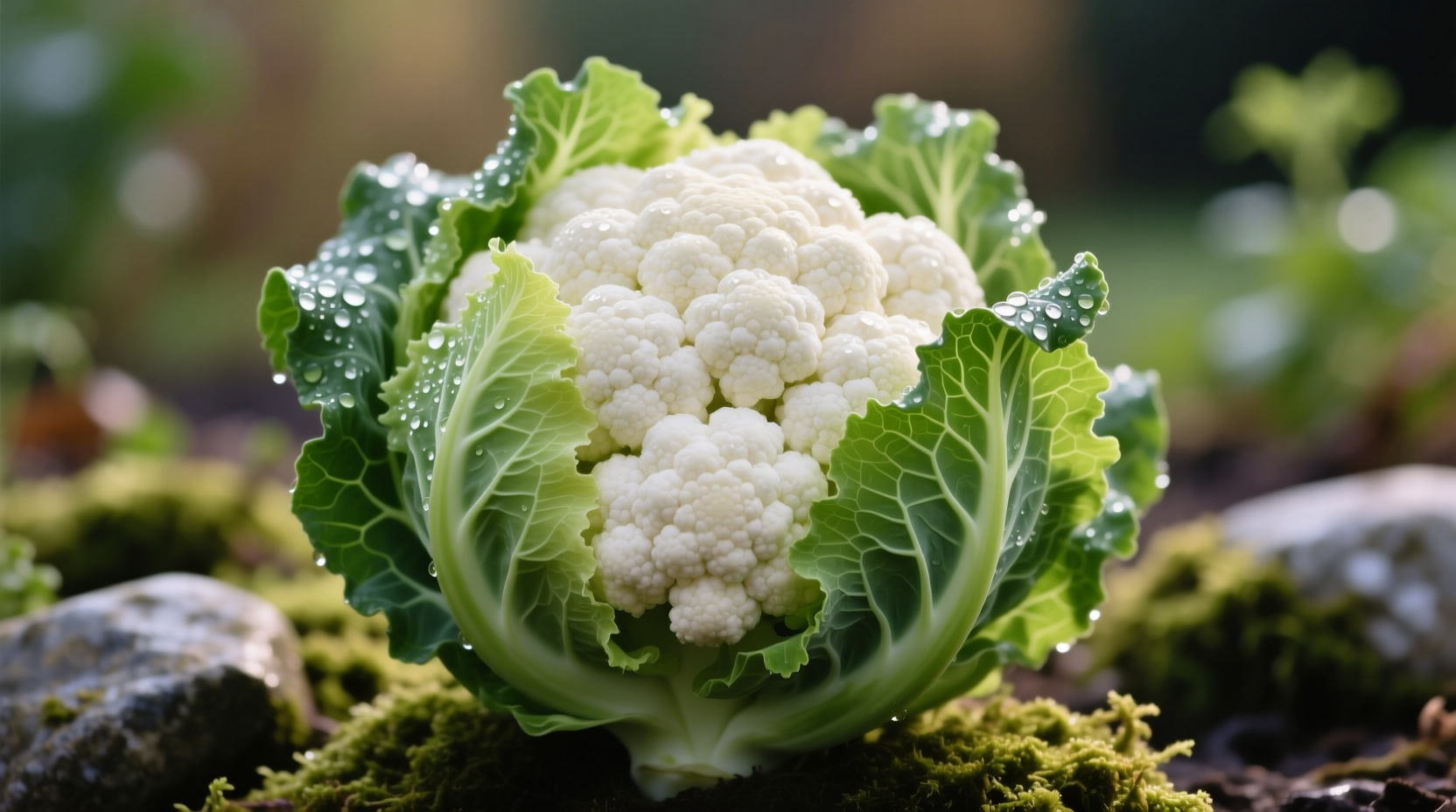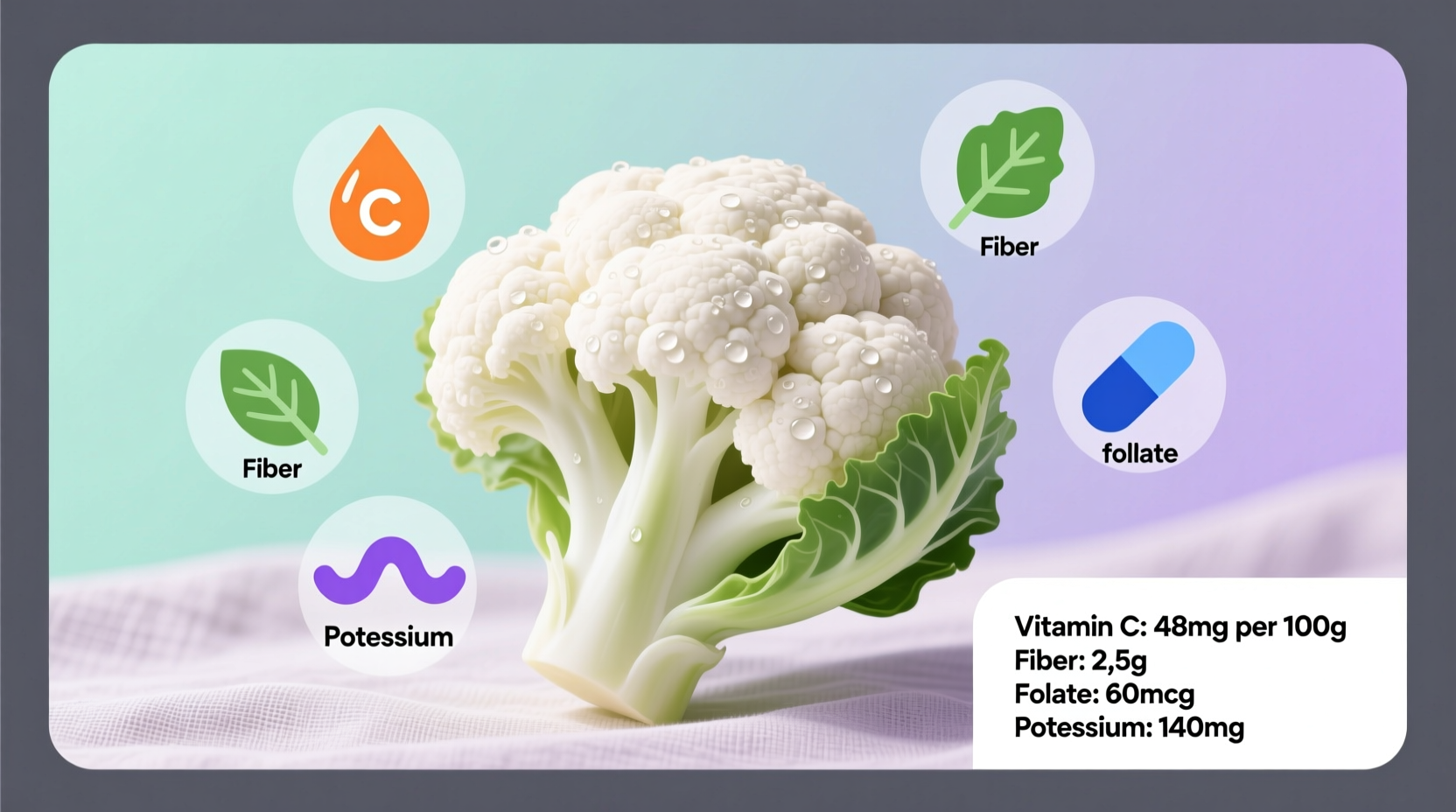One cup (100g) of raw cauliflower contains just 25 calories, 2g of protein, 5g of carbohydrates, and provides 77% of your daily vitamin C needs. This cruciferous vegetable is rich in fiber, vitamins K and B6, folate, and contains powerful antioxidants like glucosinolates that support overall health.
Discover why nutritionists consistently rank cauliflower among the top functional foods for optimal health. Whether you're managing dietary restrictions, boosting immunity, or simply seeking nutrient-dense meal options, understanding cauliflower's complete nutritional profile can transform your approach to healthy eating.
Complete Nutritional Profile of Cauliflower
When evaluating nutritional facts about cauliflower, it's essential to examine both macro and micronutrient composition. According to the USDA FoodData Central database, raw cauliflower delivers exceptional nutritional density per calorie. This versatile vegetable provides substantial vitamins and minerals while maintaining a remarkably low energy density.
| Nutrient | Amount per 100g | % Daily Value |
|---|---|---|
| Calories | 25 | 1% |
| Protein | 1.92g | 4% |
| Carbohydrates | 5g | 2% |
| Dietary Fiber | 2g | 7% |
| Vitamin C | 48.2mg | 77% |
| Vitamin K | 15.5μg | 13% |
| Folate | 57μg | 14% |
| Potassium | 299mg | 6% |
This comprehensive nutritional breakdown demonstrates why cauliflower qualifies as a nutrient-dense vegetable that delivers maximum nutritional value with minimal caloric impact. The data comes directly from the USDA's authoritative FoodData Central database, ensuring accuracy for anyone tracking their dietary intake.
Science-Backed Health Benefits of Cauliflower
Understanding the complete nutritional value of cauliflower reveals multiple health advantages supported by nutritional science. Research published in the journal Nutrients highlights how cruciferous vegetables like cauliflower contain glucosinolates, sulfur-containing compounds that convert to bioactive isothiocyanates during digestion. These compounds demonstrate significant antioxidant and anti-inflammatory properties.
Regular consumption of cauliflower contributes to:
- Enhanced immune function through its exceptional vitamin C content
- Improved digestive health from its substantial fiber content
- Bone health support via vitamin K and calcium absorption
- Cardiovascular protection through potassium and antioxidant compounds
- Cellular protection from sulforaphane and other phytochemicals
Cauliflower Compared to Similar Vegetables
When examining cauliflower nutrition facts compared to broccoli and other cruciferous vegetables, distinct nutritional advantages emerge. While both belong to the Brassica family, their nutrient profiles differ significantly:
| Nutrient (per 100g) | Cauliflower | Broccoli | Cabbage |
|---|---|---|---|
| Calories | 25 | 34 | 25 |
| Vitamin C | 48.2mg | 89.2mg | 36.6mg |
| Vitamin K | 15.5μg | 101.6μg | 76μg |
| Folate | 57μg | 63μg | 43μg |
| Fiber | 2g | 2.6g | 2.5g |
This vegetable nutritional comparison chart shows that while broccoli contains more vitamin C and K, cauliflower offers a more neutral flavor profile and greater culinary versatility. The data comes from the National Institutes of Health's Office of Dietary Supplements, providing reliable information for dietary planning.

Maximizing Nutritional Value Through Preparation
Understanding how cooking methods affect cauliflower nutritional content after cooking is crucial for preserving maximum benefits. Research from the Harvard T.H. Chan School of Public Health indicates that certain preparation techniques significantly impact nutrient retention:
- Raw consumption preserves all vitamin C and enzyme activity
- Steaming for 5 minutes retains up to 90% of nutrients
- Boiling can leach water-soluble vitamins into cooking water
- Roasting enhances certain antioxidants while reducing vitamin C
- Stir-frying preserves most nutrients when done quickly at high heat
For those following specific dietary patterns, cauliflower adapts beautifully to various eating approaches. The nutritional value of cauliflower rice remains substantial when prepared properly, offering a low-carb alternative that maintains most of the vegetable's original nutritional profile. Similarly, cauliflower nutrition facts for keto diets make it an excellent choice due to its low net carbohydrate content.
Practical Applications for Daily Nutrition
Incorporating cauliflower into your diet doesn't require complicated recipes. These practical strategies help maximize nutritional benefits while enjoying delicious meals:
- Replace half your mashed potatoes with mashed cauliflower for added nutrients
- Create nutrient-dense pizza crusts using riced cauliflower
- Add raw cauliflower florets to salads for crunch and vitamin C
- Blend steamed cauliflower into soups for creaminess without dairy
- Use cauliflower as a base for grain-free fried "rice" dishes
For individuals managing specific health conditions, the cauliflower nutritional benefits for weight loss are particularly valuable. Its high water and fiber content promotes satiety while keeping calories low. Those monitoring blood sugar will appreciate cauliflower's low glycemic index and minimal impact on glucose levels.
Addressing Common Nutritional Questions
Many people wonder about the differences between white, orange, and purple cauliflower varieties. While all share similar nutritional profiles, the colored varieties contain additional phytonutrients: orange cauliflower has beta-carotene, while purple varieties contain anthocyanins. These compounds provide additional antioxidant benefits without significantly altering the core nutritional composition.
When comparing fresh vs frozen cauliflower nutrition facts, research shows minimal differences in nutrient content. In fact, flash-frozen cauliflower often retains nutrients better than fresh produce that has been stored for extended periods. The key is proper preparation regardless of form.











 浙公网安备
33010002000092号
浙公网安备
33010002000092号 浙B2-20120091-4
浙B2-20120091-4